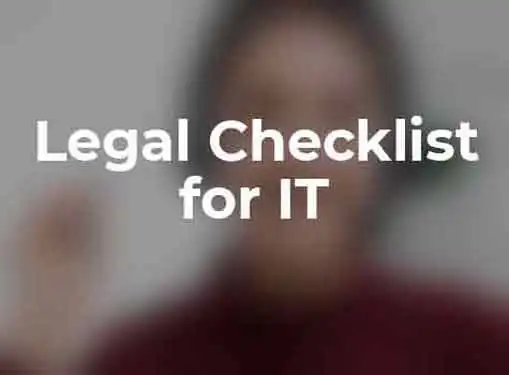Small Business Legal Issues
Legal Checklist for Information Technology
Is your business properly addressing key legal issues pertaining to information technology? This article provides a checklist of important legal issues to consider.
As technology advances, it leaves behind a rich litany of legal issues that can affect the way you run your business. Here's a series of questions to ask yourself to determine if you have a handle on the latest information technology legal issues.

Does your business insist upon protective terms and conditions when buying, selling or licensing process, hardware, software, network or website technologies?
Businesses typically exercise great care to negotiate carefully and in detail when they buy or lease real estate or contract for the development and construction of a facility. However, many businesses do not take the same precautions when they arrange for major hardware, software, integration and other information technology projects -- although such projects may be mission-critical and affect directly their products and customers.
The following are issues raised by almost every information technology project, but which are overlooked frequently for purposes of related contracts:
- Is the technology compatible with the expected installation environment?
- Are there limits on the numbers or types of users included with the pricing?
- Should there be project timetables and milestones and should payments be linked to these?
- Are there limitations on your ability to use any hardware or software for additional applications?
- Should any source code, trade secret or information be placed into escrow in case the vendor goes out of business?
- Are the basic warranty and liability allocation provisions satisfactory for the circumstances?
- Does the vendor provide sufficient documentation and post-sale service?
- What types of upgrades, later versions or releases and repairs or patches are included in the contract price?
- What type of training arrangements should be arranged?
- Who owns the rights to any inventions or enhancements arising from the project?
- What information, if any, should be treated as confidential?
- Is the vendor or supplier free to do similar works or projects for competitors?
Accordingly, every business should develop technology procurement checklists or procedures based upon its industry, products and services.
Has your business established appropriate employee policies in connection with computer, email and Internet usage at the workplace? Do employees telecommute for your business?
Electronic and communication tools, such as the Internet and lap top computers, provide employees more power and flexibility in performing their duties, in or out of the office and before, during or after normal work hours. But, they also provide increased opportunities for abuse of company resources, whether for conducting personal business at desktops, organizing unions, exposing systems to viruses and hackers or engaging in inappropriate sexual advances or conduct.
At the same, employers have greater power to monitor and gather personal data about their employees, such as by tracking Internet or email usage. As a result, to prevent misunderstandings and preserve management discretion, well-crafted information technology policies should be developed for state-of-the-art workplaces.
Share this article
Additional Resources for Entrepreneurs





Conversation Board
Do you have questions or comments on this topic? Please join in the conversation by posting your comments below.